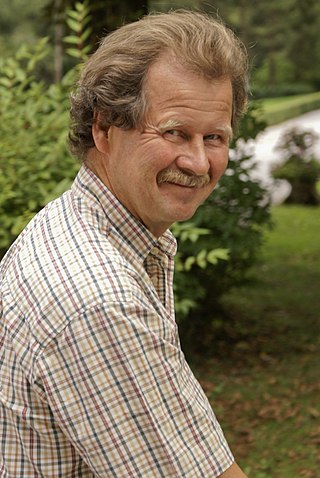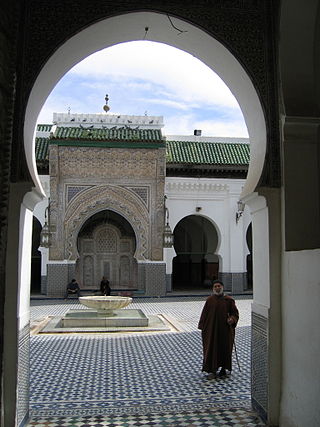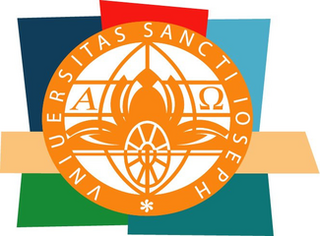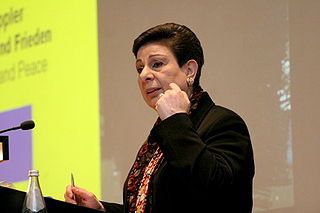
The United Nations Economic and Social Commission for West Asia is one of five regional commissions under the jurisdiction of the United Nations Economic and Social Council. The role of the Commission is to promote economic and social development of Western Asia through regional and subregional cooperation and integration.

Beirut Arab University (BAU) (Arabic: جـامعة بيروت العربية) is a Lebanese private university located in Beirut, Lebanon. It was founded by the Lebanese Waqf El-Bir wal Ihsan Society in 1960. The University attained the International Institutional Accreditation from the Foundation for International Business Administration Accreditation (FIBAA) - an official international German foundation - registered in the European Quality Assurance Register (EQAR). The University is ranked 801–1000 in the QS World University Rankings and 40 in Arab Region Rankings for 2022.

Birzeit University is a public university in the West Bank, in the State of Palestine, registered by the Palestinian Ministry of Social Affairs as charitable organization. It is accredited by the Ministry of Higher Education and located in Birzeit, West Bank, near Ramallah. Established in 1924 as an Elementary School for girls, Birzeit became a University in 1975.

Mahdi Abdul Hadi is a political scientist, historian, columnist, author, founder and member of various Palestinian, Arab and International institutions. He founded and heads the Palestinian Academic Society for the Study of International Affairs.

Manfred Nowak is an Austrian human rights lawyer, who served as the United Nations Special Rapporteur on Torture from 2004 to 2010. He is Secretary General of the European Inter-University Center for Human Rights and Democratisation (EIUC) in Venice, Italy; Professor of International Human Rights and Scientific Director of the Vienna Master of Arts in Human Rights and the Ludwig Boltzmann Institute of Human Rights and a former judge at the Human Rights Chamber for Bosnia and Herzegovina. In 2016, he was appointed Independent Expert leading the United Nations Global Study on Children Deprived of Liberty.
Ibrahim Abu-Lughod was a Palestinian academic, characterised by Edward Said as "Palestine's foremost academic and intellectual" and by Rashid Khalidi as one of the first Arab-American scholars to have a really serious effect on the way the Middle East is portrayed in political science and in America". His student Deborah J. Gerner wrote that he "took on the challenge of interpreting U.S. politics and society for the Palestinian community as well as eloquently articulating Palestinian aspirations to the rest of the world."

Saint Joseph University of Beirut is a private catholic research university located in Beirut, Lebanon, which was founded in 1875 by French Jesuit missionaries and subsidized by the Government of France during the time when Lebanon was under Ottoman rule. It is widely recognized as one of the leading and most prestigious academic institutions in Lebanon and Middle East. The institution boasts a diverse and accomplished group of alumni, who have gone on to become leading figures in politics, law, academia, literature, sciences, arts, medicine, and religion. USJ's impressive roster of graduates includes seven of Lebanon's fourteen Presidents, a Speaker of the Parliament of Lebanon, two Presidents of the Council of Ministers of Lebanon, hundreds of legislators and ministers, numerous judges, and high-ranking civil servants, among them Commanders of the Lebanese Armed Forces and executives of the Internal Security Forces. As the oldest and foremost French university in Lebanon, it not only promotes Lebanese culture but also upholds a policy of equal admission opportunity without consideration of ethno-religious affiliations. Furthermore, it advocates trilingual education, offering instruction in French, Arabic, and English. Additionally, it is known in Lebanon and the Middle East for its prominent university hospital, the Hôtel-Dieu de France, and for its prestigious and historical Faculty of Law, modern Lebanon's oldest law school and the first law school in Lebanon since the ancient Roman law school of Berytus.
The Council for Arab-British Understanding (Caabu), is a not-for-profit organisation that works for a British Middle East policy rooted in support for international law, human rights and civil society. Since it was founded in 1967, Caabu has taken on a strong advocacy, media and educational role to help shape UK foreign policy and public opinion.
Provision of education in the UAE began shortly after the establishment of the federation with the inception of the first university in Al Ain, Abu Dhabi, the United Arab Emirates University. Since then, the country has progressed with efforts of ensuring high literacy rates, modern programs and women's share in education. It works on improving its youths education which is why the agenda 2021 has been set. The UAE currently devotes approximately 25 percent of total federal government spending to education. As of 2019, the overall literacy rate is 96%.

Science and technology in Morocco has significantly developed in recent years. The Moroccan government has been implementing reforms to encourage scientific research in the Kingdom. While research has yet to acquire the status of a national priority in Morocco, the country does have major assets that could transform its R&D sector into a key vehicle for development. The industry remains dominated by the public sector, with the universities employing 58% of researchers. Morocco's own evaluation of its national research system – carried out in 2003 – revealed that the country has a good supply of well trained high quality human resources and that some laboratories are of very high quality. However, the greatest gap at that point of time lied in the link between research and innovation. The educational qualifications of Moroccan researchers have increased significantly since the early 1990s. The University of Al-Karaouine is considered the oldest continuously operating academic degree-granting university in the world.

The University of Saint Joseph is a Catholic university founded in 1996, previously known as Macau Inter-University Institute. It was jointly organized by the Catholic University of Portugal and the Diocese of Macau. It is also connected by structural, academic, and social bonds to the special administrative region of Macau, to Portugal, and to mainland China. It expresses its mission as being a private Catholic University in, of and for Macao, in of and for China, concentrating on post-graduate teaching and research, together with professional training in the liberal arts and social sciences.

The European Inter-University Centre for Human Rights and Democratisation (EIUC) is an interdisciplinary centre covering the area of human rights education and research formed by 41 universities from all European Union member states. The EIUC's activities include interdisciplinary education of students worldwide; developing training for senior officials of international organisations, field personnel, and other human rights professionals; identifying means of transferring academic expertise to the public, such as using visual arts and mass media; creating an environment for research cooperation; representing a network of graduates of the European Master's Programme in Human Rights and Democratisation. The centre is housed in the Monastery of San Nicolò al Lido which has been made available to the EIUC by the Municipality of Venice, Italy.
The Ramallah Center for Human Rights Studies (RCHRS) is an independent Palestinian non-profit and non-governmental organization that advocates human rights, democracy and tolerance from a secular perspective. It conducts theoretical and applied research, publishes studies and journals, operates educational programs and workshops and undertakes advocacy work. Its headquarters are in Ramallah and it has an office in Gaza.
University Human Rights Centers are centers established at universities for the purpose of promoting human rights and social justice locally, nationally, and globally through education, fieldwork, and other efforts.

Hanan Daoud Mikhael Ashrawi is a Palestinian politician, legislator, activist, and scholar who served as a member of the Leadership Committee and as an official spokesperson of the Palestinian delegation to the Middle East peace process, beginning with the Madrid Peace Conference of 1991. In 1996, Ashrawi was appointed as the Palestinian Authority Minister of Higher Education and Research. Prior to that, she was dean of the Faculty of Arts at Birzeit University and head of its Legal Aid Committee since the mid-1970s.
Horst Fischer born 1950 in Duisburg, Germany, is Adjunct Professor at SIPA/Columbia University in New York and Professor emeritus at Leiden University, Netherlands.
The Institute for International Law of Peace and Armed Conflict (IFHV) at Ruhr University Bochum (Germany) is one of the leading research institutes on humanitarian law and humanitarian studies in Europe.
The Arab Barometer is a nonpartisan research network that provides insight into the social, political, and economic attitudes and values of ordinary citizens across the Arab world. It has been conducting public opinion surveys in the Middle East and North Africa (MENA) since 2006. It is the largest repository of publicly available data on the views of men and women in the MENA region. The project has conducted more than 70,000 interviews over five waves of surveys across 15 countries in MENA since 2006. The project is organized through a partnership between Princeton University, the University of Michigan, and regional partners across the Middle East and North Africa. The project is governed by a Steering Committee including academics and researchers from MENA and the United States.

Ali Oumlil is a Moroccan philosopher, thinker, human rights activist, diplomat and political persona.










